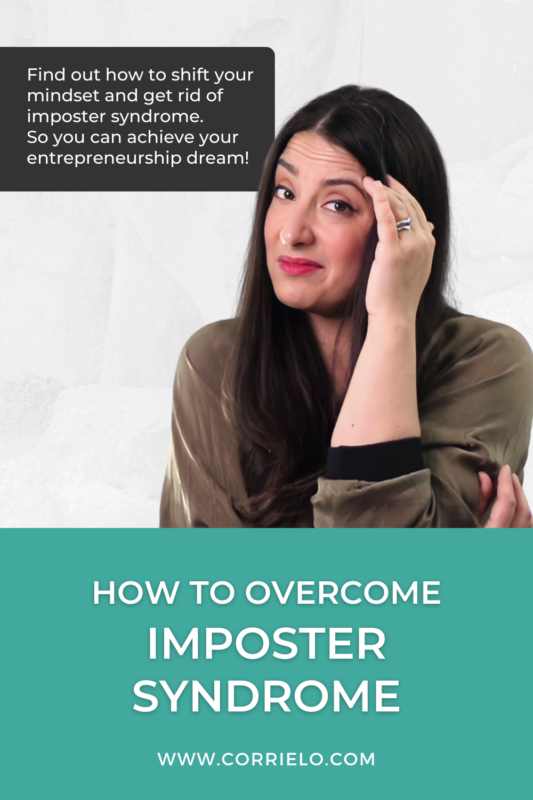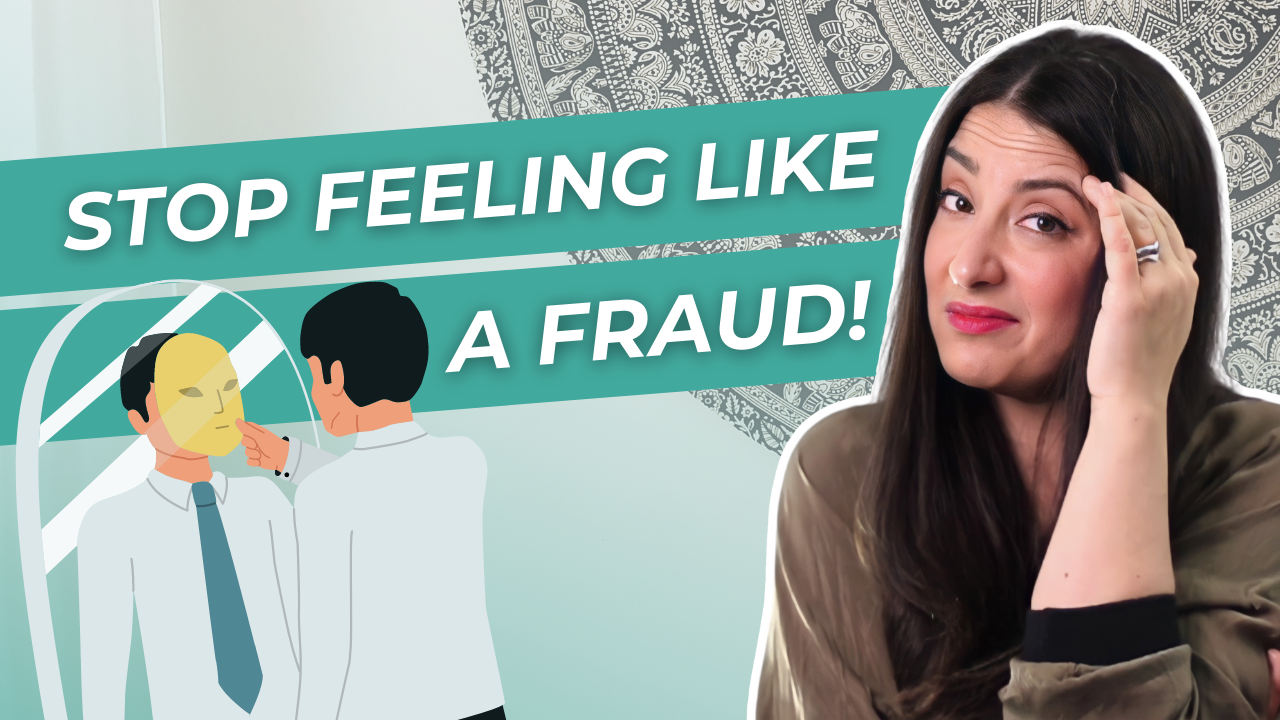There is no shame in having self-doubts, but you can get past them. Here’s how to overcome imposter syndrome and build your confidence.
Do you ever feel like you’re not good enough whatever you do? Do you feel like you’re a fraud and that everyone is about to find out?
Imposter syndrome is that nagging feeling you get whenever you’ve accomplished something, and still, you feel like you don’t deserve the praise or recognition you’ve earned. It’s that little voice inside your head that tells you over, and over that you’re not good enough, smart enough, prepared enough, or deserving of the success you are experiencing.
If you often feel this way, you’re not alone.
Over 70% of people around the world suffer from imposter syndrome.
Try to think of it: that’s a lot of people who…
…sabotage their opportunities,
…constantly downplay their successes, and
…and live in fear of being outed as a fraud!
And let’s face it: it’s just a terrible way to live – and certainly, it’s not something you should have to feel and live with!
That’s why I wrote this blog post. Today, I’m going to share:
- What is imposter syndrome
- The signs of imposter syndrome
- What causes it
- How to overcome imposter syndrome
My Personal Experience with Imposter Syndrome
Self-doubt and fear of being exposed as a fraud are some of the most debilitating feelings in the world.
I’ve experienced it myself, and to be honest? I still do… to this very day. In fact, it’s an ongoing, everyday battle, which I tried to hide by ignoring it and pretending it didn’t exist.
And really, I wasn’t even aware that I had it until recently… when a podcast host called me out on it during a live interview!
In that interview, the host asked me how I landed my TEDx, and I downplayed it. I told her that it was because many people played a part in my success – and that I didn’t do much work.
In reality, in hindsight, I did a lot of work. I polished my speaking skills; I did a ton of research. And it was because of that hard work that I landed my TEDx.
That’s when I realized that I have this habit of denying my accomplishments and trying to hide the hard work that goes into them. In other words, I tend to self-sabotage my own success – like, who does that?
Whenever something comes easily to me, I subconsciously always figure out a way to make it more difficult and break it.
Because the truth is, my brain is wired from my childhood that things should be difficult – that the only way for me to see success is to work hard. So any time that I have something that comes easily to me through alignment and ease, I always subconsciously break it, and it drives me insane.
If you think you may have imposter syndrome but are quite unsure about it, I encourage you to stop, take a moment, and assess yourself. Here are the seven telltale signs of imposter syndrome:
7 Telltale Signs of Imposter Syndrome
So, let’s go ahead and break down the telltale signs of imposter syndrome:
1. Dismissing positive feedback and compliments.
When you often have doubts about your own capabilities, it can be hard to accept positive feedback or compliments. It can be even harder to believe them!
Imposter syndrome is when you dismiss compliments and positive feedback from others because you don’t believe you deserve them. In fact, some of the most common responses of people with imposter syndrome include phrases like, “it was nothing,” or “I was just doing my job.”
And yes, this is exactly what I had done in my podcast interview regarding my TEDx Talk.
So, if you’re always downplaying your achievements or saying that your achievements are a result of somebody else’s hard work, or some kind of circumstance or just luck, you just might have imposter syndrome.
2. Ongoing fear of being outed as a fraud
Imposter syndrome usually manifests as a fear of being “found out” – that you’re a fraud, and people will realize you don’t belong or deserve your position or recognition. It can happen at any point in your life or career, even after achieving success.
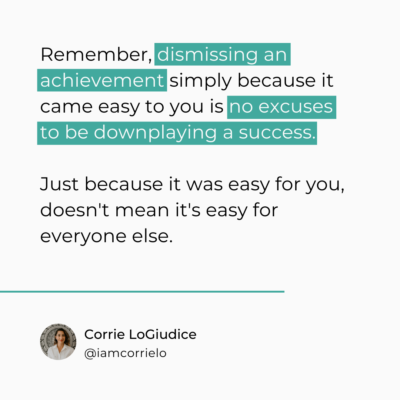
3. Feeling unworthy of your successes
Imposter syndrome can lead to feelings of unworthiness and inadequacy. It can result from believing that you’re not good enough to be where you are.
When you believe that you’re not good enough, you can feel like you don’t deserve success. You can feel like you’re not a good entrepreneur… even when you truly are when you put your heart and mind into it.
And let me tell you: if you doubt the worthiness of your successes, then it’s definitely a sign that you have imposter syndrome.
4. Perfectionism
Perfectionism can be a double-edged sword. On one hand, it helps you be more thorough and methodical.
On the other, it could prevent you from getting anything done. After all, perfectionists often over prepare for just about everything. And usually, it stems from fear that if they don’t over prepare, someone will find out that they’re a fraud.
So, if you find yourself stressing over getting everything done perfectly, procrastinating, or constantly thinking about how you’re going to look to others if you fail, you must be suffering from imposter syndrome.
5. Underlying feelings of anxiety
When you often feel like you’re not good enough, it can lead to feelings of high alert, anxiety, and stress. It can make you feel like you’re constantly on the verge of failure.
And if this persists, without a doubt, it can also make you feel like a fraud.
6. Self-sabotaging your success
When you’re afraid of being exposed as a fraud, you can often sabotage your own successes, which is a common way that imposter syndrome manifests.
Self-sabotage could come in many forms. You may intentionally fail to prepare, or you’d downplay your efforts. You may even procrastinate or become overly critical of yourself and your work… and the list goes on!
Absolutely anything that could potentially lead to you being found out as a fraud can be self-sabotaging. Self-sabotaging your success is often a classic imposter syndrome sign.
7. Lacking self-confidence and self-esteem
If you lack confidence in yourself and your abilities, it can manifest itself in many ways. For example, you might underperform because you’re too scared to try something new. Or you might sabotage yourself by doing things that undermine your credibility. You might even start doubting your ability to succeed in the future.
If you lack confidence in yourself, you can easily fall prey to imposter syndrome.
4 Top Causes of Imposter Syndrome
There could be several causes of imposter syndrome, but the following are the most common ones:
1. Your personality
If you’re a Type A Personality or somebody who is very driven and hardworking, it can be easy to feel that you don’t deserve success, especially if that success came easily to you.
Why? Because you may have believed your whole life that success will always take hard work and effort. And even if you managed to achieve success easily out of decades’ worth of accumulated experience and knowledge, you’ll still think you’re not “worthy.”
2. Your family environment
If you come from a family of overachievers (like I do), that nagging pressure to succeed might be more difficult to shake off. Besides, how can you ever measure up to the achievements that other family members have already attained?
It’s like being that artist in a family of doctors – and you don’t even know if you’ll ever “belong.”
As a result, this can lead to feelings of inadequacy, which in turn leads to impostor syndrome.
3. Minority stress
There’s a reason why minority groups tend to suffer from higher rates of depression and anxiety than the rest. One of the reasons for this is that members of minorities often face discrimination in society. This can cause them to internalize negative stereotypes about themselves and others, leading to feelings of inferiority and self-doubt.
As a result, they may start questioning whether they belong or even deserve success.
To be honest, I know this feeling very well – because, for years, I had been working as a female in a male-dominated industry. I had no peers who were like me, and sad to say, I was constantly being dismissed and ignored. My ideas were also constantly put down. In the end, I felt like I didn’t belong – to the boys’ club and had to prove myself all over again.
Ultimately, this led to my feelings of insecurity and doubt, and ultimately, impostor syndrome.
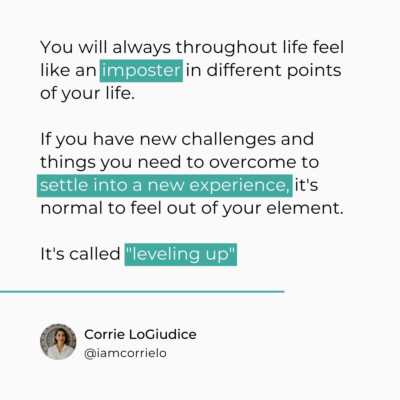
4. Any situation in life
Let me break it to you: imposter syndrome will never go away. In fact, it might occur and reoccur at different points in your life, especially when new challenges come up.
And here’s the thing: you’re going to feel like a fish out of water!
For example, new moms can feel like imposters because they’re suddenly thrust into a world where they’re expected to be perfect parents. They may feel inadequate and insecure because they’re new, and they’re scrambling to do things the “right” way.
Likewise, entrepreneurs, especially new ones, can feel like impostors because there are tons of things they must learn, and still, they’re expected to perform perfectly.
That’s why, when things are new and challenging, it’s very easy to succumb to imposter syndrome.
3 Ways on How to Overcome Imposter Syndrome
Now that you know what imposter syndrome is and how to tell if you have it, let’s go ahead and look at how to deal with it.
Here are three ways how to overcome imposter syndrome:
1. Stop beating yourself up over it.
Constantly giving yourself that negative self-talk will not do you any good. So instead of saying things like: “I’m a fraud,” “I’m not good enough,” or “I don’t deserve the recognition,” you may want to give yourself a little more compassion. Give yourself some space to learn the ropes.
Most importantly, you must keep in mind that you’re in a temporary place, and soon enough, you’ll move on to something else. So, don’t beat yourself up about it. Just keep going.
2. Learn how to assess and address your feelings of being a fraud.
Feelings of fraud are just emotions, and just like any emotion, you can learn to control them. But first, you need to be able to identify them when they arise so that you can take the necessary actions.
So, for example, if you feel like you’re an entrepreneur imposter for being brand new in the world of business, you could ask yourself questions such as: “What exactly is the thing I feel like I don’t know that I’m doing?”
Because here’s the thing: you need to get clear on exactly what you don’t feel confident about so you can then take ownership of that confidence. Afterward, you can go out and get the skills, education, and support you need to build up that confidence.
3. Gaining clarity on your actual talents, skills, and overall strengths.
When we talk about imposter syndrome, one of the most common things people say is that they feel like their talents are not very strong. They think that they’re not smart enough or lack certain skills.
But the truth is that everyone has unique talents and skills. And while some people might be better at some than others, no one person is completely average. Everyone has something that they’re great at.
But the thing is, as a society, we’re expected to fit in a box like everybody else, right?
And if we don’t, we feel inferior to the rest of the group. That’s when we start to doubt ourselves – even though being different can be a strong asset.
The best way to combat this feeling is by asking yourself honestly what your true talents and skills are. What can you do that others can’t do or replicate?
I know how difficult this can be to answer. Because sometimes our talents and skills aren’t obvious. Sometimes we don’t realize that we’re good at something until someone tells us. If you’re unsure, I have an exercise that might help you find your hidden talents.
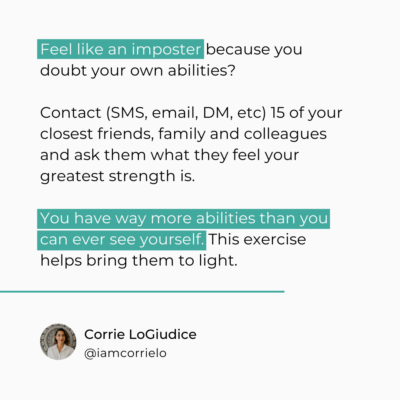
The Clarity Confidence Booster
Disclaimer: This can be a scary exercise. You’ll have to muster your courage to ask people for feedback. But trust me, it’s worth it!
So, here’s how it works.
1. Make a list of 10-15 people. They could be your friends, family, colleagues, and other people you know, love, and respect.
2. Reach out to them through email, DM, phone, or even arrange a face-to-face meeting with them.
3. Ask each one on your list this question: What do you believe my greatest strength is?
OPTIONAL: If you’re super scared to do it, you may want to inform them that you’re doing this exercise that you saw on a Youtube video.
That’s it! It’s a very simple exercise.
And I promise you; you’ll be amazed at the responses that come back. In fact, I did this a few years ago, and I must say, it was so eye-opening. I didn’t know that people saw so many things in me that I never would have seen in myself had I not asked!
That’s why I challenge you to try this today. You’ll be surprised at what you learn.
In Conclusion
Imposter syndrome is a real, debilitating, and persistent feeling that many of us face.
It’s something that I had to learn to deal with myself, too, and I’m so glad that I became aware of it. Because only through awareness can you start to change it. And that’s what I want to help you do.
I hope I was able to shed light on the reality of imposter syndrome and what causes it. And if you are dealing with imposter syndrome, I hope the tips on how to overcome imposter syndrome I shared will help you.
And one last thing…
If you’re interested in transitioning towards entrepreneurship, I highly recommend taking my Entrepreneur Mindset Quiz. This quick 8-question quiz will help you determine how confident you are as an entrepreneur.
And even if you’re still not there yet, this free resource will give you the things you need so you can become one step closer to achieving your goals!
